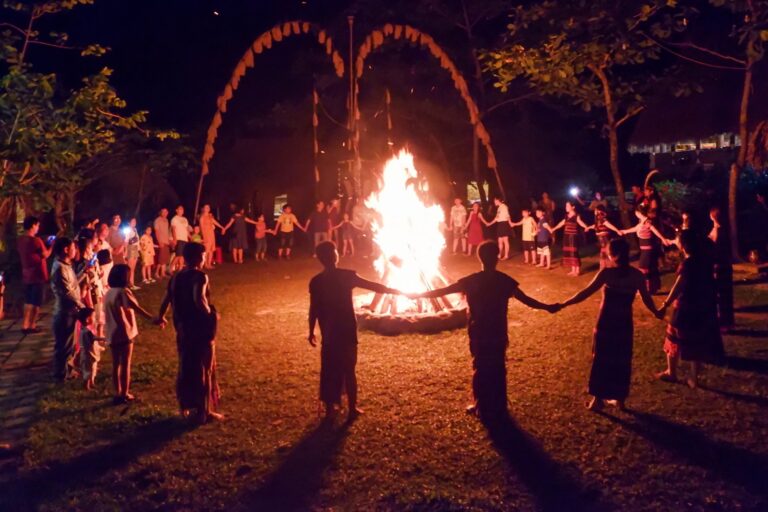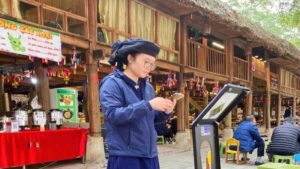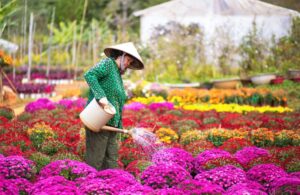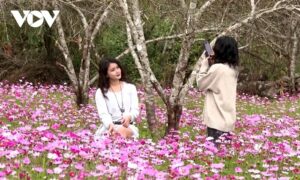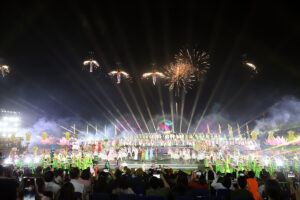Revitalizing family economies and fostering local economic growth are the outcomes of agri-tourism across numerous provinces and cities nationwide. This path also represents a sustainable approach for a genuinely eco-friendly agri-tourism sector.
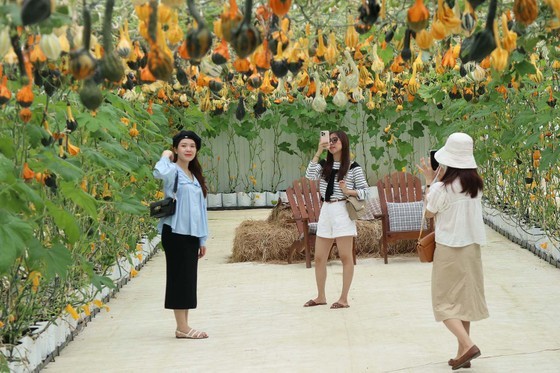
Tourists visit Thien Nga pumpkin farm on Cam Ly Street, Ward 7, Da Lat City.
Billions in revenue
Lam Dong Province was the pioneer among all the regions in the country to experiment with the agri-tourism model. In 2015, the People's Committee of Lam Dong Province sanctioned a pilot project aimed at establishing agri-tourism models within the region to harness the potential and advantages of agriculture, create new products catering to tourism, generate additional income, solve employment problems, and advertise local agricultural products. Besides the positive outcomes, the implementation process also gave rise to various challenges and difficulties, including issues related to construction criteria, land-use planning, construction planning, the proportion of roofed and open-air structures on agricultural and non-agricultural land, conversion of agricultural land to non-agricultural purposes, and more. Within this context, some investors in Da Lat took risks by not fully adhering to the legal procedures for investing in tourism projects, displaying indications of constructing and changing land-use purposes that do not adhere to regulations.
For instance, the agri-tourism investment project "Malakai," led by Malakai Limited Liability Company in Ward 10, Da Lat City, proceeded to construct several prefabricated accommodation categories without authorization, resulting in a violation that mandated the demolition of an area exceeding 3,400 square meters. Similarly, the agri-tourism project "Vuon Thuong Uyen bay" (Elevated Royal Garden) in Ward 10, Da Lat City, faced penalties and the forced removal of various categories due to the absence of investment approval.
In September 2020, the People's Committee of Lam Dong Province issued a temporary directive to temporarily halt the approval of investment projects for the development of agri-tourism sites in the region. By April 2021, Chairman Tran Van Hiep of the Lam Dong Provincial People's Committee issued a decision outlining temporary regulations for investment and the management of agri-tourism business activities in the province. Nevertheless, the established construction criteria continue to pose a significant obstacle to the implementation of agri-tourism. The majority of the land is designated for agricultural use, yet the criteria stipulate that a construction permit (for sites with construction projects) and project acceptance must be obtained before putting them into operation.
Ms. Nguyen Thi Bich Ngoc, Deputy Director of the Department of Culture, Sports, and Tourism of Lam Dong Province, revealed that her department had led and coordinated efforts with relevant units to draft regulations governing investment and the management of agri-tourism activities in Lam Dong Province for the 2023-2030 period. The preliminary regulations have been submitted to the Department of Justice for evaluation before being presented to the Provincial People's Committee for approval. Furthermore, Mr. Pham S, Vice Chairman of the Lam Dong Provincial People's Committee, has provided guidance, emphasizing that when formulating regulatory documents for agri-tourism investment and management in the region, it should be made explicit that households possessing pre-existing agri-tourism assets need not submit investment proposals but are mandated to register their businesses. It is an open direction to assist local residents in concentrating on infrastructure development and accommodating tourists.
Last weekend, while exploring Da Lat City in Lam Dong Province, Phan Thi Hoa, a tourist from Ho Chi Minh City, had a delightful surprise when she encountered a vast coffee plantation at the Thuy Thuan tourist site in Hamlet 1, Ta Nung Commune. This plantation is an investment by the Thuy Thuan Da Lat Import-Export Limited Company. At this farm, Hoa had the opportunity to gain insights into the coffee production process, distinguish between various coffee varieties such as arabica, robusta, and cherry, and witness coffee trees heavily laden with ripe red berries for the very first time. Currently, this location has become a sought-after destination for many groups of tourists who seek an agri-tourism experience during their visit to Da Lat.
Visiting the Puppy Farm, tourists are easily captivated by the space with carefully-arranged agricultural products. Located on Cam Ly Road in Ward 7, Da Lat City, this expansive 4-hectare farm is divided into two distinct areas. The first is the reception area, featuring a showcase of local specialty products and a garden teeming with various flower varieties, as well as llamas, ponies, lapdogs, and even pet mice. However, the primary attraction can be found in the 2-hectare division, where tomatoes, pumpkins, succulents, and strawberries are cultivated.
As per the signage in each sub-division, visitors have the opportunity to delve into and gain insights into high-tech agricultural production processes, handpick strawberries, and savor the freshly-harvested products directly in the garden. Nguyen Thai Linh, a tourist from Nha Trang City, remarked, "The combination of farming and hosting visitors is truly captivating, especially with the integration of high-tech agricultural production methods." According to Ms. Nguyen Vu Quynh Nhu, the manager of this attraction, this farm welcomed over 200,000 visitor arrivals in 2022.
As reported by the Department of Culture, Sports, and Tourism of Lam Dong Province, between 2018 and 2020, the collective revenue generated from agri-tourism models in the region approached nearly VND250 billion. Agri-tourism products have enhanced the preservation of local cultural and historical heritage, provided stability to people's livelihoods, and made a gradual contribution to the local economic growth.
Unique ecotourism products
The Mekong Delta region currently boasts approximately 43 prominent tourist destinations, with the majority of them being ecotourism and agri-tourism spots. These locations are recognized through joint efforts between the Mekong Delta Tourism Association and local authorities, following common conditions and voting criteria established and agreed upon by provinces and cities. From the beginning of the year until now, the Mekong Delta has welcomed over 27 million visitor arrivals. Many businesses in Long An, Tien Giang, Ben Tre, and Can Tho have also invested in distinctive agricultural eco-tourism and rural tourism areas.
The distinctiveness is exemplified by the meticulous attention to detail from the investors. For example, the Phong Dien area in Can Tho is celebrated for its pastries, seasonal fruits, rivers, and mini-scenes, recreating the old Southern lifestyle. In the regions of Tien Giang and Vinh Long, the scenes of paths with moss roses (Portulaca grandiflora), setting dip nets on canals, and setting bamboo fish traps at sunrise are brought to life. Dong Thap Province is renowned for flower gardens and lotus ponds showcasing their vibrant colors throughout the four seasons, allowing travelers to capture these moments freely. Rose, an Australian tourist, said excitedly that in those tourist destinations, tourists not only sightsee and take photographs but also have the opportunity to pick fruits, savor local freshwater fish, engage in vegetable cultivation, and wade through rice paddies to grow rice.
In Kien Giang, each year, before the crop, the luamua.net website publishes plans and schedules for tourists, encompassing activities from seed sowing, rice planting, tending, harvesting, rice threshing, sun-drying, hand-grinding rice, cooking meals to relishing a variety of wild vegetables and freshwater fish. This innovative approach merges tourism with rice production of Le Quoc Viet, a 37-year-old farmer of Minh Phu Ward in Minh Luong Town, Chau Thanh District, Kien Giang Province, affectionately known as “Tu Viet lua mua” (Viet winter rice). Viet harbors the ambition of establishing a cultural preservation center for winter rice, aiming to attract visitors and safeguard the beauty of agricultural cultural heritage.
Tourist destinations beneath the forest canopy, such as Tram Chim National Park in Dong Thap Province, Tra Su cajuput forest in An Giang Province, U Minh Thuong National Park in Kien Giang Province, and U Minh cajuput forest in Ca Mau Province, are increasingly enchanting to visitors with their pristine landscapes and a wide range of specialties featuring shrimp, fish, and more. Mr. Bui Quoc Thai, Director of the Department of Tourism of Kien Giang Province, acknowledges that ecotourism is a positive trend. However, excessive rapid development without comprehensive planning can adversely affect the lives of local residents and indigenous cultures. Therefore, it is imperative to prioritize preservation, protection, and environmental conservation, with a strong emphasis on sustainable development.
By Doan Kien, Quoc Binh, Xuan Quynh – Translated by Gia Bao



